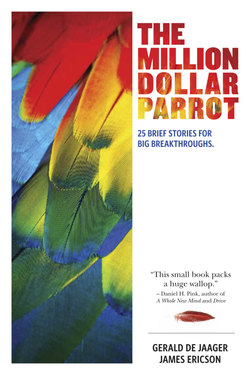Читать книгу The Million Dollar Parrot: 25 Brief Stories for Big Breakthroughs - Gerald de Jaager - Страница 4
На сайте Литреса книга снята с продажи.
ОглавлениеThe Scent on the Floor
What you leave behind can help you or it can hurt you.
When Estée Lauder retired in 1994 as head of the cosmetics company that bears her name, she commanded a privately-held business empire that controlled 45 percent of the cosmetics market in American department stores, employed more than 10,000 people in 118 countries, and registered annual sales exceeding four billion dollars. Quite a journey for the woman born Josephine Esther Mentzer in New York City, who according to Time magazine “stalked the bosses of New York City department stores until she finally got some counter space at Saks Fifth Avenue in 1948.”5
As her company grew, Lauder decided to expand internationally. In 1960, she succeeded in opening its first overseas outlet in one of London’s top department stores, Harrods. From there, she anticipated success throughout Europe. “If I could start with the finest store in London, all the other great stores would follow,” she said.6
But Paris was to prove more challenging than London. The perfume buyer at Galeries Lafayette, Paris’s most prestigious department store, was disdainful of this upstart American woman with the made-up French-sounding first name. He refused even to meet with her.
After trying fruitlessly for several days to obtain an appointment, Lauder took matters into her own hands. She walked into the perfume section of Galeries Lafayette, uncapped a bottle of Youth Dew (her company’s most successful perfume), turned it over, and emptied it onto the carpet.
Harvard Business School professor Nancy Koehn reported what happened next in her book, Brand New:
Over two days, shoppers repeatedly asked Galeries Lafayette saleswomen where they could purchase the scent. Some of these conversations took place in the presence of the store’s cosmetics buyer, who was impressed with women’s enthusiasm for Youth Dew. Within a few weeks, Estée Lauder opened her first counter in Galeries Lafayette.7
Sure, there’s a lot of potential inspiration in this story, about knowing what you want and having the moxie to go after it. Don’t let us stop you from pondering that and acting on it. But since this is a book about metaphors for leaders, you could also ask yourself about the “scent” you and your company leave behind, and how that affects your relationships with customers and others.
There was a time when this issue most commonly arose during a scandal or crisis: Johnson & Johnson gained market share because of how it handled its Tylenol tampering crisis; Ford lost it as a result of the denials and apparent disinformation it issued regarding its Pintos’ combustible gas tanks.
But in today’s increasingly transparent and connected world, the aftereffects of any company’s internal and external interactions—its reputation: the scents it leaves behind—may be among the most important factors for achieving enduring success. So argues Dov Seidman in his bestselling 2007 book, HOW.8 The influential columnist Thomas Friedman wrote about Seidman and incorporated Seidman’s views into his own bestseller, The World Is Flat. In a column, Friedman explained:
Seidman’s simple thesis is that in this transparent world “how” you live your life and “how” you conduct your business matters more than ever, because so many people can now see into what you do and tell so many other people about it on their own without any editor. To win now, he argues, you have to turn these new conditions to your advantage.9
The scent Estée Lauder left behind lasted a few days and affected perhaps a few thousand shoppers, yet it was enough to transform her company’s future. Today what you leave behind can reach millions in moments and endure in cyberspace for decades; its potential impact is inestimable.10
Many wise writers have recognized the usefulness of scent as a metaphor for considering our personal lives. Shakespeare’s Lady Macbeth says, “Here’s the smell of the blood still; all the perfumes of Arabia will not sweeten this little hand”; Ralph Waldo Emerson observed, “Happiness is a perfume you cannot pour on others without getting a few drops on yourself”; and Henry Ward Beecher advised, “A man ought to carry himself in the world as an orange tree would if it could walk up and down in the garden, swinging perfume from every little censer it holds up to the air.”11
What are you leaving behind you, at work, at home, and elsewhere, today and in the long run? If you consider it as a scent, what’s it like?
Poem for a Man with No Sense of Smell
by Kate Clanchy12
This is simply to inform you:
that the thickest line in the kink of my hand
smells like the feel of an old school desk,
the deep carved names worn sleek with sweat;
that beneath the spray of my expensive scent
my armpits sound a bass note strong
as the boom of a palm on a kettle drum;
that the wet flush of my fear is sharp
as the taste of an iron pipe, midwinter,
on a child's hot tongue; and that sometimes,
in a breeze, the delicate hairs on the nape
of my neck, just where you might bend
your head, might hesitate and brush your lips,
hold a scent frail and precise as a fleet of tiny origami ships, just setting out to sea.
